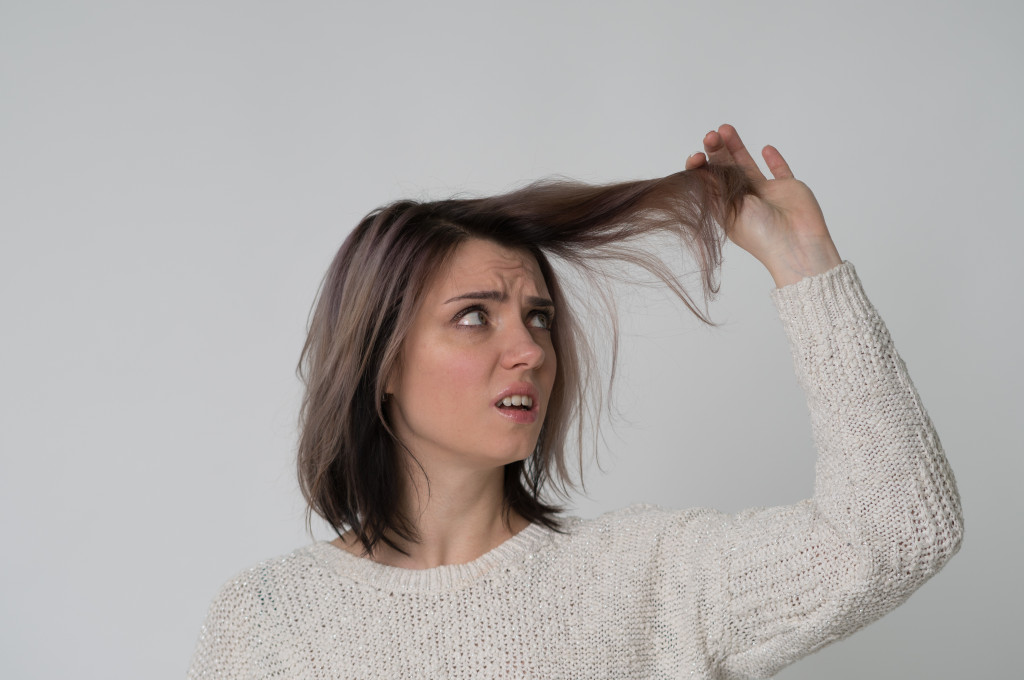- Hair loss in women can be caused by genetic, environmental, and hormonal factors.
- Stress, medication, and genetics can all contribute to hair loss.
- Mental health issues such as depression and low self-esteem are likely to arise with hair loss.
- Solutions for excessive hair loss include wearing wigs, natural remedies, diet changes, stress management, and medical treatments.
- It is important to consult a doctor before attempting any treatment.
Hair loss is something that most people associate with men. However, women also suffer from excessive hair loss. While it’s normal to lose some hair daily, if you notice that more than the usual amount of hair is falling out or that your scalp is getting more visible, it might be time to look into what causes this problem and how you can address it.
Common Causes of Hair Loss in Women
Genetic and environmental factors can cause hair loss in women. Here are some of the most common:
- Hormonal Changes – A woman’s hormones fluctuate throughout her life due to pregnancy, menopause, and other hormonal imbalances. These changes can cause hair thinning and even balding in some cases.
- Stress – Excessive stress can lead to telogen effluvium, a condition where the body sheds excessive amounts of hair due to shock or trauma. This type of hair loss usually resolves itself once the stress has subsided and the body returns to its normal state.
- Medication – Certain medications used to treat medical conditions such as depression, high blood pressure, or thyroid problems can also cause temporary hair loss as a side effect.
- Genetics – For many women, genetics play an important role in their propensity for experiencing excessive hair loss or baldness. If you have family members who experienced premature balding or heavy shedding of their locks, chances are higher that you could experience those symptoms too.
Mental Health Impact of Loss of Hair

For some people, hair loss can cause feelings of shame or embarrassment because society places so much importance on physical appearance. This is particularly true for women, who often associate long locks with beauty and femininity. In fact, some studies suggest that women are more likely to experience depression due to hair loss than men.
Moreover, no matter how “strong” someone may be, they naturally struggle with feeling unattractive when they lose their hair. This can lead to low self-esteem and feelings of isolation or loneliness. Some might even avoid social situations where they don’t want people to see them without their hair, leading to further isolation and depression.
Solutions for Excessive Hair Loss
Fortunately, there are several solutions available for treating excessive hair loss in women. Here are some ways you can help restore your locks back to normal:
Wigs
When the condition is too severe to be treated with medications or lifestyle changes, wearing a wig can provide a quick solution. Wigs are available in various styles, colors, and lengths to help you achieve the look that best suits you. Look for natural-looking wigs made of natural hair. This will help you achieve a more natural and believable look.
Natural Remedies
Natural remedies, such as vitamins or natural oils like coconut oil, may help treat hair loss. Certain natural herbs like saw palmetto, aloe vera, and green tea have been found to reduce the effects of DHT (dihydrotestosterone), which is a hormone associated with hair loss.
Diet
Eating a balanced diet with plenty of protein-rich foods like lean meats and legumes will help ensure your body has all the nutrients it needs for healthy hair growth. Taking vitamin supplements may also help boost your intake of essential minerals and vitamins necessary for proper follicle development and health.
Stress Management
Managing stress levels is key when dealing with excessive hair loss due to telogen effluvium or other medical conditions caused by stressors in your life. Regular exercise and meditation can help reduce stress levels while improving overall health simultaneously!
Medical Treatment

If lifestyle changes don’t seem to be helping with your case of excessive shedding, consider consulting a doctor about possible medical treatments like medication or laser therapy to stimulate new growth on your scalp.
Final Thoughts
Women experience excessive amounts of hair fall just as much as men do—if not more so—due to hormonal changes, stressors in our lives, medications we take for various conditions, and illnesses we might have (or our genes). Fortunately, several available solutions range from lifestyle changes like managing our diets better and reducing our stress levels to possible medical treatments like medication or laser therapy, which may help stimulate new growth on our scalps! It’s always best to consult a doctor before attempting any treatment, so make sure you do that if you’re experiencing abnormal amounts of shedding!
